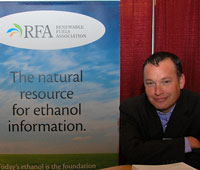Another challenge to the waiver allowing 15% ethanol blends in regular gasoline was made last week by Congressman Jim Sensenbrenner (R-WI) who introduced legislation to “require that the EPA certify, not only that a new fuel will not lead to emissions increases, but also that the fuel will not reduce fuel efficiency or damage engines.”
The Renewable Fuels Association says Sensenbrenner is “missing the point” when it comes to allowing American consumers the choice of using E15 ethanol blends and that EPA has already thoroughly tested E15 for safety – enough to make approximately 4,700 round trips from Washington to Milwaukee.
 In an interview at the National Association of Farm Broadcasting annual meeting, RFA Director of Market Development Robert White talked about the status of the E15 waiver and when we can expect the fuel to become commercially available. “We’re close,” White says. “The EPA is going through some final information that we’ve submitted from an implementation plan to the health effects testing. We actually expect a green light at any moment.”
In an interview at the National Association of Farm Broadcasting annual meeting, RFA Director of Market Development Robert White talked about the status of the E15 waiver and when we can expect the fuel to become commercially available. “We’re close,” White says. “The EPA is going through some final information that we’ve submitted from an implementation plan to the health effects testing. We actually expect a green light at any moment.”
However, once it is approved at the federal level, White says the attention turns to the states, which have different statutory regulations for fuel sales. If the states require their own labeling, White says it will be in addition to the label already approved by the EPA, that clearly states how consumers should use E15. “We’re trying to make sure that consumers have all the information they need to make the right choice and we think they’re smart enough to figure that out,” he said, noting that RFA is complementing the efforts of EPA with a consumer education campaign.
Listen to my interview with Robert White here: RFA's Robert White




 USDA has announced funding for a series of projects to convert biomass to energy through USDA’s Rural Energy for America program (REAP). The announcement this week concludes 2011 biomass project funding assistance for a total of 52 projects with just over $31 million in grant and loan note guarantees through program.
USDA has announced funding for a series of projects to convert biomass to energy through USDA’s Rural Energy for America program (REAP). The announcement this week concludes 2011 biomass project funding assistance for a total of 52 projects with just over $31 million in grant and loan note guarantees through program.
 Ethanol industry leader
Ethanol industry leader  With presidential candidate Michele Bachmann in Iowa this week, the
With presidential candidate Michele Bachmann in Iowa this week, the 

 The
The 